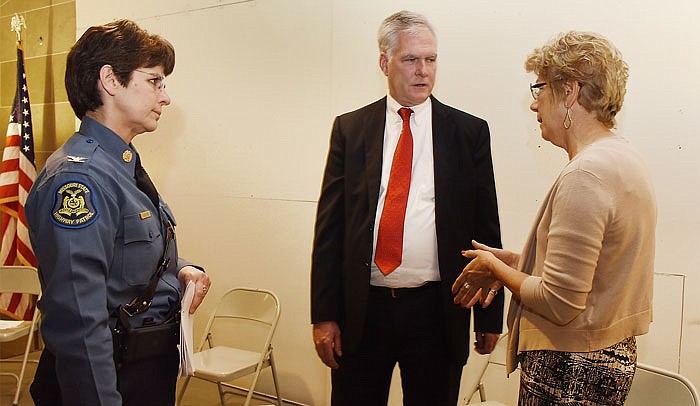Nine years and a month ago, Jane Fulhage became a widow.
After dinner in Columbia, Fulhage and her husband, Charles Fulhage, went to their separate vehicles to head to their farm near Rocheport.
Charles never made it; his small pickup was rear-ended on Interstate 70 by a larger pickup, driven by a man officials said was high on marijuana and cocaine. Charles died six days after the wreck.
"The last words that Charlie told me were, 'I'll see you at home,'" Jane recalled during a 15-minute address to Monday's Crime Victims Week program in the Capitol Rotunda. "On Feb. 26, 2008, I lost my husband, my best friend and my partner."
Married nearly 30 years, they had "just begun dreaming about things we wanted to do after he retired."
William Downs, then 33, Liberty, eventually was convicted in Boone County of first-degree involuntary manslaughter in the accident, and of possession of a controlled substance.
But, Fulhage noted, Downs should not have been behind the wheel, because he only weeks earlier had refused a breath test in St. Charles County. State law said such a refusal resulted in an automatic one-year license suspension.
However Downs got a deal from the St. Charles County prosecuting attorney and a judge and was allowed to continue driving.
"There should be no deals when someone refuses to take a breath test - the person should be taken to jail and the license taken away immediately," Fulhage said.
She noted only immediate family members can give a victim's impact statement before sentencing is issued, while the "person who has committed the crime and been found guilty can have anyone under the sun get up and talk on his, or her, behalf."
Jane thinks the law should be changed so the restrictions are the same for each side.
Downs was sentenced to a 10-year prison term, based on the jury's
recommendation.
Fulhage argued jurors should be told their recommended sentence becomes the maximum punishment a judge can impose. "The judge's hands are tied if he or she thinks it should be a longer sentence," she said.
And she thinks prosecutors should be able to charge second-degree murder in cases like her husband's, where driving under the influence is a factor in a fatal accident. Currently, they are limited to manslaughter charges.
"I feel strongly that the maximum sentencing for DWI, resulting in death, should be increased" from the current 15 years, Fulhage said, noting that an armed robbery conviction can carry a 30-year sentence.
Missouri's Constitution already gives victims rights in the criminal process and, Fulhage said, state laws should be strengthened to make sure that happens.
"There is no recourse for victims if their rights are ignored or violated," she said. "As victims and survivors, we do not get do-overs."
Jason Lamb, a former prosecutor and director of the Missouri Association of Prosecuting Attorneys, said there's a balancing act between victims' rights and those of an accused person.
"It's really not that difficult, as long as you keep it in perspective," he said. "The good thing is, I feel confident that strides have been made since the time (the Fulhage) case occurred, and that things are better - and get better, quite frankly, every year, every day and every month."
Johanna Olsen Henry - whose mother and brother were killed in a Sunday morning, head-on collision in Russellville, caused by a drunk driver - attended Monday's ceremony and agreed with Fulhage that victims' rights need to be strengthened.
"Our drunk driver petitioned to get out of prison after seven years," she said. "That is not OK for a victim."
That case hinged on the definition of "violence" in a fatality accident, with the state Supreme Court saying the accident was violent, as defined by law.
"You not only have physical injuries," Henry said Monday. Then 14, she was in the van when it was hit by Larry Gene Welch.
"You have lifelong mental problems with it, too."
Cole County Prosecutor Mark Richardson is the prosecutors association's president-elect and took the opposition to Welch's early release to the state Supreme Court.
"By strengthening our victims, we are better able to get the truth out in court," he told about 100 people attending the ceremony.
"Our victims now are allowed to make a statement - and some of those statements have been very powerful, because they speak from the heart about what the crime has done to their family."

